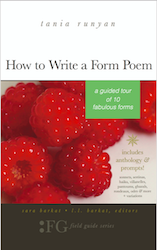
10 of the Best Quotes From “The Love Song of J. Alfred Prufrock”!
Sandra Heska King has taken Tweetspeak’s latest Poetry Dare, and is reading T. S. Eliot poems every day for 30 days. To support her in the challenge, we’ve gathered up ten great quotes from The Love Song of J. Alfred Prufrock. The full text of the poem follows the quotes. When you’re done, check in on Sandra and find out the answer to the question, “Do I dare?”
Do I dare
Disturb the universe?
2.
I have seen the moment of my greatness flicker,
And I have seen the eternal Footman hold my coat, and snicker,
And in short, I was afraid.
3.
And I have known the arms already, known them all—
Arms that are braceleted and white and bare
4.
I grow old … I grow old …
I shall wear the bottoms of my trousers rolled.
5.
Do I dare to eat a peach?
Click to get FREE 5-Prompt Mini-Series
6.
In the room the women come and go
Talking of Michelangelo.
7.
And indeed there will be time
To wonder, “Do I dare?” and, “Do I dare?”
8.
In a minute there is time
For decisions and revisions which a minute will reverse.
9.
I have measured out my life with coffee spoons.
10.
After the cups, the marmalade, the tea,
Among the porcelain, among some talk of you and me.
BUY ‘HOW TO WRITE A FORM POEM’ NOW!
The Love Song of J. Alfred Prufrock, by T. S. Eliot
S’io credesse che mia risposta fosse
A persona che mai tornasse al mondo,
Questa fiamma staria senza piu scosse.
Ma perciocche giammai di questo fondo
Non torno vivo alcun, s’i’odo il vero,
Senza tema d’infamia ti rispondo.
Let us go then, you and I,
When the evening is spread out against the sky
Like a patient etherized upon a table;
Let us go, through certain half-deserted streets,
The muttering retreats
Of restless nights in one-night cheap hotels
And sawdust restaurants with oyster-shells:
Streets that follow like a tedious argument
Of insidious intent
To lead you to an overwhelming question …
Oh, do not ask, “What is it?”
Let us go and make our visit.
In the room the women come and go
Talking of Michelangelo.
The yellow fog that rubs its back upon the window-panes,
The yellow smoke that rubs its muzzle on the window-panes,
Licked its tongue into the corners of the evening,
Lingered upon the pools that stand in drains,
Let fall upon its back the soot that falls from chimneys,
Slipped by the terrace, made a sudden leap,
And seeing that it was a soft October night,
Curled once about the house, and fell asleep.
And indeed there will be time
For the yellow smoke that slides along the street,
Rubbing its back upon the window-panes;
There will be time, there will be time
To prepare a face to meet the faces that you meet;
There will be time to murder and create,
And time for all the works and days of hands
That lift and drop a question on your plate;
Time for you and time for me,
And time yet for a hundred indecisions,
And for a hundred visions and revisions,
Before the taking of a toast and tea.
In the room the women come and go
Talking of Michelangelo.
And indeed there will be time
To wonder, “Do I dare?” and, “Do I dare?”
Time to turn back and descend the stair,
With a bald spot in the middle of my hair—
(They will say: “How his hair is growing thin!”)
My morning coat, my collar mounting firmly to the chin,
My necktie rich and modest, but asserted by a simple pin—
(They will say: “But how his arms and legs are thin!”)
Do I dare
Disturb the universe?
In a minute there is time
For decisions and revisions which a minute will reverse.
For I have known them all already, known them all:
Have known the evenings, mornings, afternoons,
I have measured out my life with coffee spoons;
I know the voices dying with a dying fall
Beneath the music from a farther room.
So how should I presume?
And I have known the eyes already, known them all—
The eyes that fix you in a formulated phrase,
And when I am formulated, sprawling on a pin,
When I am pinned and wriggling on the wall,
Then how should I begin
To spit out all the butt-ends of my days and ways?
And how should I presume?
And I have known the arms already, known them all—
Arms that are braceleted and white and bare
(But in the lamplight, downed with light brown hair!)
Is it perfume from a dress
That makes me so digress?
Arms that lie along a table, or wrap about a shawl.
And should I then presume?
And how should I begin?
* * * *
Shall I say, I have gone at dusk through narrow streets
And watched the smoke that rises from the pipes
Of lonely men in shirt-sleeves, leaning out of windows? …
I should have been a pair of ragged claws
Scuttling across the floors of silent seas.
* * * *
And the afternoon, the evening, sleeps so peacefully!
Smoothed by long fingers,
Asleep … tired … or it malingers,
Stretched on the floor, here beside you and me.
Should I, after tea and cakes and ices,
Have the strength to force the moment to its crisis?
But though I have wept and fasted, wept and prayed,
Though I have seen my head (grown slightly bald) brought in upon a platter,
I am no prophet—and here’s no great matter;
I have seen the moment of my greatness flicker,
And I have seen the eternal Footman hold my coat, and snicker,
And in short, I was afraid.
And would it have been worth it, after all,
After the cups, the marmalade, the tea,
Among the porcelain, among some talk of you and me,
Would it have been worth while,
To have bitten off the matter with a smile,
To have squeezed the universe into a ball
To roll it toward some overwhelming question,
To say: “I am Lazarus, come from the dead,
Come back to tell you all, I shall tell you all”—
If one, settling a pillow by her head,
Should say: “That is not what I meant at all;
That is not it, at all.”
And would it have been worth it, after all,
Would it have been worth while,
After the sunsets and the dooryards and the sprinkled streets,
After the novels, after the teacups, after the skirts that trail along the
floor—
And this, and so much more?—
It is impossible to say just what I mean!
But as if a magic lantern threw the nerves in patterns on a screen:
Would it have been worth while
If one, settling a pillow or throwing off a shawl,
And turning toward the window, should say:
“That is not it at all,
That is not what I meant, at all.”
* * * *
No! I am not Prince Hamlet, nor was meant to be;
Am an attendant lord, one that will do
To swell a progress, start a scene or two,
Advise the prince; no doubt, an easy tool,
Deferential, glad to be of use,
Politic, cautious, and meticulous;
Full of high sentence, but a bit obtuse;
At times, indeed, almost ridiculous—
Almost, at times, the Fool.
I grow old … I grow old …
I shall wear the bottoms of my trousers rolled.
Shall I part my hair behind? Do I dare to eat a peach?
I shall wear white flannel trousers, and walk upon the beach.
I have heard the mermaids singing, each to each.
I do not think that they will sing to me.
I have seen them riding seaward on the waves
Combing the white hair of the waves blown back
When the wind blows the water white and black.
We have lingered in the chambers of the sea
By sea-girls wreathed with seaweed red and brown
Till human voices wake us, and we drown.
Photo by Claire Haidar, used with permission.
Browse more T. S. Eliot poems
Browse more Poets and Poems
- Earth Song Poem Featured on The Slowdown!—Birds in Home Depot - February 7, 2023
- The Rapping in the Attic—Happy Holidays Fun Video! - December 21, 2022
- Video: Earth Song: A Nature Poems Experience—Enchanting! - December 6, 2022


L. L. Barkat says
I loved this poem the first time I read it (though completely had no idea what it was talking about) and I love it still. This is Eliot genius at its accessible best (and by accessible, I don’t mean knowing what the poem means, but being able to feel the poem in your psyche)
Sandra Heska King says
You had no idea, either? Well, then, I don’t feel quite so bad.
I still keep repeating those first lines in my head:
“Let us go then, you and I,
When the evening is spread out against the sky…”
And that yellow fog? I thought about Sandburg and fog and little cat feet that (I looked it up) was published the year after, in 1916.
Chris Yokel says
Laura, I agree. This was my first exposure to Eliot’s poetry. I had no idea what he was talking about, but I knew in my bones I loved it.
Maureen Doallas says
Us and I and You
I have swept the street of oyster shells,
braceleted the house in lamplight,
watched night scuttling out of windows
for talk of you. I have visions of us
in your room, you and me, taking our time
on a soft October evening,
your long hair spread like seaweed
in patterns on a pillow, your skirts
half-deserted on the floor, your voice
after a while settling to sing
me no more
lonely beside you
asleep. Arms and eyes and back
I prayed to know,
I wake and meet.
And after, tea and toast and marmalade
yellow ices on rich cakes,
a red platter with just one peach
I roll to you on a dare.
Come morning,
your tongue no doubt curled
about the simple if overwhelming question
of us and I and you.
Sandra Heska King says
Oh, wow, Maureen! I think I might be blushing… peachy pink.
Marina Sofia says
The quote that always got to me, ever since I first read T. S. Eliot (perhaps because The Tempest is my favourite Shakespeare play and it is reminiscent of Full Fathom Five Thy Father Lies) is the following:
We have lingered in the chambers of the sea
By sea-girls wreathed with seaweed red and brown
Till human voices wake us, and we drown.
Dafydd ap Hugh - aka David Hughes says
Oh yes I read and devoured T.S.Eliot in my youth – 70 years ago. I even adopted the use of lower case that he and others of his time affected in their poetry, fo rmy published prose.
Now at 89 I struggle to find words to express my awareness of my aging. So I frequently hark back to his lines – “I grow old. I grow old. I shall wear my trousered rolled.”
Norene says
My favorite quote of all times….”I grow old. I grow old. I shall wear the bottoms of my trousers rolled.” How appropo!
Delwar Hosen says
There will be time,there will be time!
elisa wild says
Lovely words …… evocative words…wrap up around you…